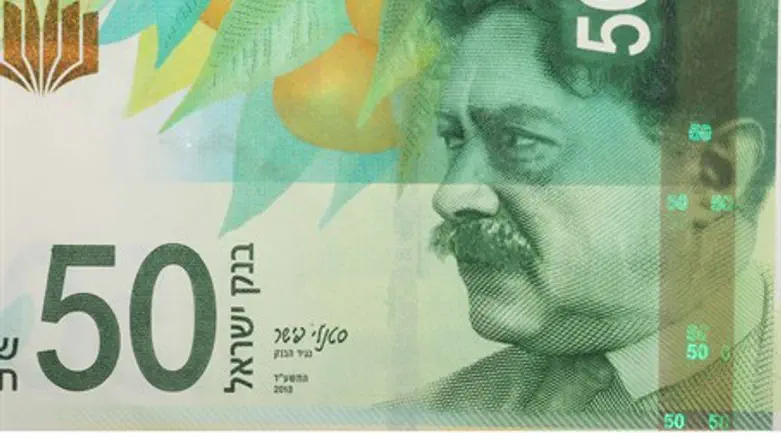
A new 50 shekel banknote bearing the likeness of Russian-born Hebrew poet Shaul Tchernichovsky (1875-1943) entered circulation on Tuesday, but Dr. Hagai Ben-Artzi of Bar Ilan University refuses to use the new note and calls on others to follow suit.
Ben-Artzi, who is the brother-in-law of Prime Minister Binyamin Netanyahu and lectures on the Torah and Jewish Thought, told Arutz Sheva that the new banknote is a disgrace to the state of Israel.
The noted lecturer reminded that Tchernichovsky was married to a Christian woman his entire life, and refused the insistent pleading of former Chief Ashkenazic Rabbi Shlomo Goren to have her convert to Judaism as befitting the wife of a key Hebrew poet in modern Israel.
"Shaul Tchernichovsky became a symbol of assimilation - the ideology of assimilation. It cannot be that a man like this, even with all his importance as a poet, should become a symbol of the state of Israel," said Ben-Artzi.
The new note sends exactly the wrong message at a time when "in Europe there's an 80% rate of assimilation and in the United States 60% assimilation," argued Ben-Artzi. "The Jewish people are becoming annihilated due to assimilation; how can the state of Israel be capable of turning precisely Tchernichovsky into a symbol?"
Ben-Artzi also criticized the Jewish Home party for not speaking out against the committee recommendation to use Tchernichovsky in the new bank note; the criticism comes at a time of talk in the party of splitting due to fears of a changing focus away from religious Zionism.
"Where is the Jewish Home?" asked Ben-Artzi. "Where are the hareidi parties? Where is the Likud party that declares itself to be Jewish and nationalist?"
Calling for a boycott on the new banknote, Netanyahu's brother-in-law stated "each any every one of us is obligated to explain the problem with the note. We must not accept this miserable decision to push this man into every home in Israel."
"Is the state of Israel deriding us? We will turn the decision into a public discussion. In every street corner they will talk about the problem. If a million citizens will not use the note, the state will have no choice but to remove it from financial circulation," concluded Ben-Artzi.